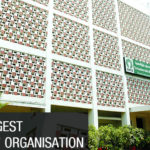Bangladesh has the potential to produce $1.2 billion worth of recycled textile and garment items
Spinners in Bangladesh are facing a shortage of waste cotton and textile scraps since a major portion of them is shipped abroad amid higher demand for recycled yarns and fabrics worldwide.
Bangladesh, the second largest apparel producer in the world, sees a huge volume of cotton textile scraps, but these wastes are usually dumped into a landfill, burned, exported, or recycled into low quality fabrics.
This means the countntry misses the opportunity to produce recycled yarn from the bi-products with a view to manufacturing the apparel products whose demand is rocketing globally. Owing to fast fashion the term used to describe clothing designs that move quickly from the catwalk to stores to take advantage of trends and cheaper clothing items, cotton consumption has gone up.
Higher cotton farming is hampering the environment whereas the manufacturing of apparel involves more groundwater, especially during washing and dyeing.
So, many clothing retailers and brands such as H&M prefer the reuse and recycling of garments to avoid environmental damage. But a section of local traders in Bangladesh feels encouraged to export waste cotton and fabrics than sell them in the local market because of the price factor. The shipments of waste cotton and scrap rose 49.67 per cent year on year to $153.38 million in the July-December half of the current financial year. It was $102.48 million during the same period a year earlier.
This forces millers to buy recycled yarns from from international markets. This means local manufacturers are paying more for the imported goods that are already available locally. In some cases, imported recycled yarns are made from the wastes and scrap fabrics exported from Bangladesh.
In 2019, Bangladesh produced approximately 5,77,000 tonnes of waste just from the ready-made garments and fabrics mills of which almost half was 100 per cent pure cotton waste, according to the Circular Fashion Partnership project led by Global Fashion Agenda, with partners Reverse Resources and the Bangladesh Garment Manufacturers and Exporters Association (BGMEA).
On the other hand, Bangladesh heavily relies on the import of textile fibre.
The country imported 1.63 million tonnes of staple cotton fibre in 2019 with a value estimated to be $3.5 billion. And if the 100 per cent cotton waste is recycled within Bangladesh, imports could decrease by around 15 per cent, therefore saving $500 million that would have been spent on cotton imports, said the Circular Fashion Partnership.
Cotton imports were more than S3 billion in 2021
Md Abdur Rouf, executive director of Bhaluka based Simco Spinning & Textiles Ltd, says currently, the company is producing 20 tonnes of recycled yarn a day against the capacity of 50 tonnes.
Since the demand for recycled yarn made apparel is growing worldwide, the company is fully booked for the next three months. But, Rouf’s company is facing difficulties when it comes to sourcing scraps and waste cotton from the local market as traders prefer to export them.
Almost all kinds of apparel items such as T-shirts and denim and knitted fabrics are made from recycled yarns.
International retailers and brands nominate recycled yarns as eco friendly consumers also want companies to manufacture more garment items from recycled yarn and fabrics. The demand for recycled yarn and fabrics is so high that the company has reinvested almost every year to expand its production capacity.
In 2010, Simco began its journey with an investment of Tk 60 crore. Later, it reached Tk 150 crore.
Square Textiles Ltd is also witnessing a recycled raw materials shortage. “In many cases, the same recycled materials are mixed with the cotton local millers import,” said Taslimul Haque, operation director of the company.
BGMEA President Faruque Hassan says the demand for apparel made from recycled yarns is growing globally as consumers are increasingly getting conscious of the importance of protecting the environment. “So, the export of textile scraps is also growing from Bangladesh.”
He cited scraps and waste cotton as the asset of the country and urged the government to put a restriction on their exports. “A separate hub of waste cotton and scraps should be built so spinners don’t face any crisis of raw materials,” he said.
Hassan thinks a new opportunity has been created for Bangladesh as buyers favour apparel made from recycled yarn and fabrics.
“The value addition in the recycled yarn is higher than the traditional yarn made from cotton and manmade fibre as scraps are entirely generated locally,” he added.
According to the Global Fashion Agenda and McKinsey & Co., Bangladesh has the potential to produce $1.2 billion worth of recycled textile and garment items as the country has a big production base for cotton fibre clothing items.






